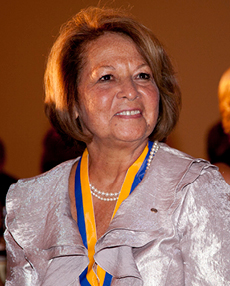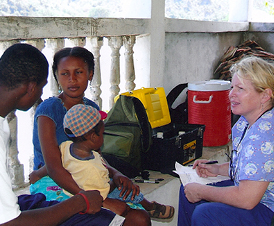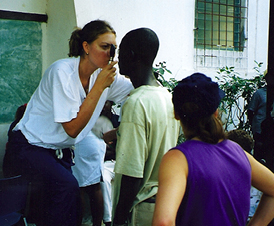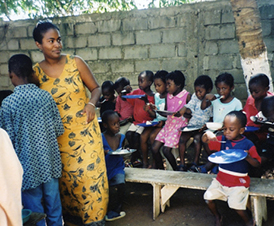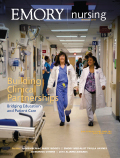An Unexpected Life's Work
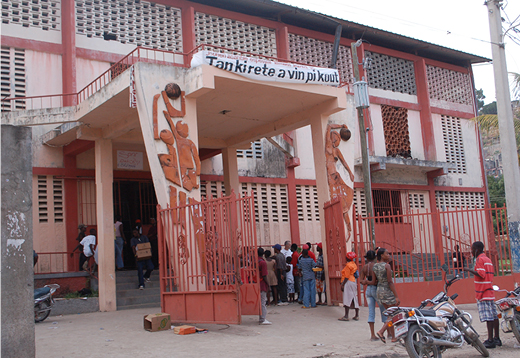
Eternal Hope in Haiti set up a triage center in Cap-Haitien to care for families following last year's earthquake.
Divine orchestration led Emory Medalist Twilla Haynes to serve vulnerable patients in Haiti and in Georgia
|
Twilla Haynes 80MN is the ninth nursing alumna to receive an Emory Medal. |
BY DANA GOLDMAN
Let’s get a few things straight from the start. When Twilla Haynes 80MN was coming of age in rural North Carolina, she wasn’t interested in nursing, much less working in a place like Haiti.
But come January 2010, when a 7.0 magnitude earthquake shook the tiny Caribbean country, Haynes had worked in Haiti for almost 30 years—first as a medical volunteer, then as a founder of the primary care charity Eternal Hope in Haiti, and finally as founder of a Haitian orphanage for medically fragile children. Following the earthquake, Eternal Hope in Haiti was tapped to coordinate a triage center in the city of Cap-Haitien. This past fall, Haynes was awarded the Emory Medal, the university’s highest alumni honor, for her humanitarian work in Haiti and in Georgia.
The path of her life, Haynes would agree, has included some zigs and zags.
An orchestrated start
It’s no wonder that nursing didn’t appeal to Haynes as a child. None of her family members were nurses, and her only contact with the field involved a lone public health nurse who provided vaccinations at her school through a mobile health clinic. Teaching was a more obvious career match.
But with six siblings, money for college was limited. When her family found out about a nursing scholarship, Haynes applied for it and won—and promptly fell in love with the profession. It is one of those events that Haynes calls divinely orchestrated.
With her nursing degree in hand, Haynes provided patient care in hospitals, volunteered with a mobile clinic, and established rural primary care clinics in northwest Georgia. In between, she started a family, earned additional degrees in law and nursing (becoming one of the first American Indian nursing students at Emory), and taught nursing students in Georgia.
|
Angela Haynes 91MPH 08N 09MN (above) and Hope Haynes Bussenius 93MN (below) co-founded Eternal Hope in Haiti with their mother to expand primary care for families. |
When an opportunity came about for those students to go to Haiti on a service-learning trip in the early 1980s, they pushed for Haynes to come along as their faculty adviser. There, the group assisted local doctors and nurses triaging hundreds of Haitians with too few medical supplies and no reliable power source to keep medical equipment going. Typhoid fever, malaria, HIV, and meningitis were common. Because of the severe shortage of medical supplies, these medical professionals didn’t always use gloves. Syringes typically were in short supply.
Despite the disconcerting conditions, Haynes left feeling hopeful. “I learned how simple it was to save lives,” she says. “When I got back home, I realized we’re not talking about rocket science. It’s primary care, it’s learning about these diseases, working side by side with these strong practitioners.”
Soon Haynes was raising funds for medical supplies and building her skills in Haiti through regular trips designed to briefly relieve overwhelmed Haitian health care providers. As her daughters grew up, they took up the cause as well, following their mom to Haiti, to Emory, and to nursing. In 1993, Hope Haynes Bussenius 93MN and Angela Haynes 91MPH 08N 09MN joined with their mother to found Eternal Hope in Haiti.
Their experiences in Haiti continually influence Angela’s work stateside. “I developed numerous skills over the years of volunteering in Haiti that allowed me to serve patients with increased compassion, better advocacy, and confidence in my ability to make a difference one patient at a time,” she says. “The greatest gift of my mom is her legacy of caring exemplified in all aspects of her life. She models continued dedication and a relentless spirit of service, and I am forever grateful for her example.”
|
"The greatest gift of my mom is her legacy of caring exemplified in all aspects of her life. She models continued dedication and a relentless spirit of service, and I am forever grateful for her example." —Angela Haynes, Eternal Hope in Haiti co-founder |
||||
CDC nurse epidemiologist Jenny Williams 96N 01MN/MPH is also grateful. She met Haynes through the Georgia Association of Nursing Students in the early 1990s and first traveled to Haiti in 1994. Williams credits Haynes for propelling her into public health.
“Twilla was able to demonstrate to me that prevention goes a long way,” Williams says. “If someone has clean water, vaccinations, shelter, food, and security, you can have some profound health effects by attending to basic needs.”
In the years since that trip, Williams has returned to Haiti with Haynes several times. Also, Williams and Barbara Reed 57N 79MN nominated Haynes for the Emory Medal—an obvious choice, Williams says.
“Twilla’s not only taken an interest in me but also in so many other people. She has really championed the underserved her entire life and has nurtured that value in countless students, health care professionals, and volunteers over the years.”
|
Cheron Hardy 03MN cares for medically fragile children at Hope Haven Orphanage. |
Now, more than 40 years after Haynes’ introduction to nursing, Eternal Hope in Haiti provides primary care in seven rural communities that previously had little to no access to doctors or nurses. The nurses and nursing students keep coming back.
Providing nursing care in Haiti is no different from the care that Haynes has provided in rural Georgia for much of her career. “One day I’m in northwest Georgia setting up primary care clinics, and the next week I could be in Haiti in a mountainous area’s isolated village doing primary care. So it’s just a difference in the disease profile and your resources,” she says.
Starting an orphanage for medically fragile children never crossed Haynes’ mind until 1996, when she found herself nursing two ill babies with no family caregivers in sight. Neither child would survive without constant care, but hospitals were out of the question.
“For patients in the hospital, their families are the source of their food and medications,” Haynes explains. “If a family member’s not there, it doesn’t look good. We’d learned over the years that we could handle the babies better if we kept them out of the hospital.”
By the time she left Haiti for home, she’d founded Hope Haven Orphanage, leased a building, and hired staff with money raised primarily through word-of-mouth donations. Now 62 medically fragile children call Hope Haven their home. And they’re in good hands, Haynes says. “We have a full-time, masters-prepared family nurse practitioner with those kids 24/7.” That FNP happens to be Cheron Hardy 03MN, who has worked at the orphanage since graduation. Hardy and Haitian staff members have nursed hundreds of children back to health. One child, who arrived at Hope Haven at age 6, became president of his high school senior class. “The majority of children do beautifully,” Haynes says.
Post-earthquake
Providing medical care has proved more challenging in the months since the earthquake. “Our staff there have been bombarded,” says Haynes. In the aftermath, the United Nations transferred tens of thousands of Haitians from Port-au-Prince to Cap-Haitien, placing increased demands on the clinics. For six weeks, Eternal Hope in Haiti coordinated care at the city’s triage center, and months later, the needs continue. “More of those folks know our faces, and we have a long list of names now of people who come from really fragile family units,” Haynes says. “So it’s a difficult time for the work, but it’s also a rewarding time because you can do more.”
Haynes knows she can’t turn around Haiti’s dismal economy or prevent future earthquakes. But she does know that it takes just a moment for a nurse to begin healing a patient in pain. All those moments strung together are creating change in small communities, in large cities, and in Haiti as a whole.
That big picture—made up of small victories—keeps the Emory Medalist going. “We’re just moving forward,” Haynes says with a determined smile.
Writer Dana Goldman works with Atlanta National Public Radio affiliate WABE.
|
Online: Listen as Twilla Haynes talks about founding Hope Haven Orphanage at bit.ly/hopehaven. Learn more about her humanitarian work at bit.ly/haynesmedal. |
||||


